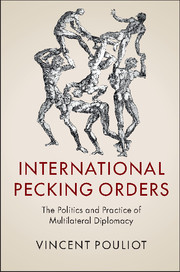Book contents
- Frontmatter
- Contents
- List of figures
- List of tables
- Preface and acknowledgments
- List of abbreviations
- Introduction: All the world's a stage
- Part I Situations
- 1 The politics of multilateral diplomacy
- 2 A practice theory of social stratification
- Part II Dispositions
- Part III Relations
- Part IV Positions
- Conclusion: The “miracle” of multilateral pecking orders
- Appendix: Research design, methods and data
- References
- Index
2 - A practice theory of social stratification
from Part I - Situations
Published online by Cambridge University Press: 05 March 2016
- Frontmatter
- Contents
- List of figures
- List of tables
- Preface and acknowledgments
- List of abbreviations
- Introduction: All the world's a stage
- Part I Situations
- 1 The politics of multilateral diplomacy
- 2 A practice theory of social stratification
- Part II Dispositions
- Part III Relations
- Part IV Positions
- Conclusion: The “miracle” of multilateral pecking orders
- Appendix: Research design, methods and data
- References
- Index
Summary
How do social hierarchies – “the ordering of actors as superior or inferior to one another in socially important respects” – form? This chapter focuses on the processes by which social stratification emerges in and through practice. The focus is on concrete, ordinary situations in which practitioners interact. In fact, most of the arguments that I advance in the following pages are not specific to the international or diplomatic realm. This should not come as a surprise, to the extent that my starting point – the notion that practices structure interactions – applies to any social sphere, from the family to the workplace and so on. In fact, my main theoretical sources of inspiration, sociologists Erving Goffman and Pierre Bourdieu, never produced a single piece of work that would qualify as IR. Beyond multilateral diplomacy, then, any kind of configuration with minimal dynamic density – from the classroom to dispersed social networks online – is prone to the same dynamics of social stratification that I theorize here. In order to illustrate my framework, though, the last part of the chapter connects the theoretical framework back to the world of multilateral diplomacy.
Practice theory is a large and diverse movement in social theory as well as in IR theory and there currently is much debate going on about what practices are, what they do, where they come from, how best to study them and so on. In this book I put forward one particular take on practice theory, which combines the sociological approaches of Goffman and Bourdieu. Essentially, I turn to Goffman in order to theorize the productive effects of practices and to make sense of the micro-processes of social dramaturgy. From Bourdieu, I retain an interest in the power politics and agonistic nature of practice and practical mastery. Each of these influences will show quite clearly, I think, in what follows. Needless to say, though, the approach that I develop here does not exhaust the variety of practice theories that are currently on offer in IR and beyond.
At the risk of oversimplifying, practice theory may be construed less as a substantive social theory than as a thick methodology. Perhaps its most important contribution to knowledge development, to stay at a fairly basic level, is in specifying the unit of analysis: practice, that is, socially meaningful patterns of action.
- Type
- Chapter
- Information
- International Pecking OrdersThe Politics and Practice of Multilateral Diplomacy, pp. 48 - 68Publisher: Cambridge University PressPrint publication year: 2016



